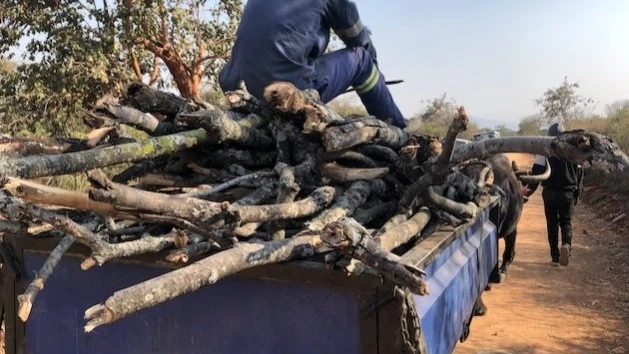As forests felled wood shortage hits villagers in Zimbabwe

LINET Makwera (28) has a baby strapped on her back as she totters barefoot, picking tiny pieces of wood on both sides of a dusty and narrow road, peering fearfully at people passing by along the road in Chimanimani’s Mutambara area in Gonzoma village located in Zimbabwe’s Manicaland Province, east of the country.
Her fears, Makwera says, are the patrolling plain clothes police officers, who often target people, cutting down the few available trees in search of firewood.
In the midst of firewood shortages countrywide, more than 300,000 trees were destroyed between 2000 and 2010, according to Zimbabwe’s Ministry of Environment and Climate Change.
In fact, in 2011, the Forestry Commission of Zimbabwe found out that the country was losing about 330,000 hectares of forests per year. According to Global Forest Watch in 2010, Zimbabwe had 1.01 Mha of natural forest, extending over 2.7 percent of its land area. In 2023, it lost 4.67 kha of natural forest, equivalent to 3.27 Mt of CO₂ emissions.
A slight drop from the previous one, currently, Zimbabwe’s annual deforestation rate is estimated to be at 262,348.98 hectares per annum, the Forestry Commission says.
According to UNDP in 2022, the use of local forests for fuel wood has also been one of the many drivers of deforestation in the country.
UNDP has been on record, saying presently, fuel wood accounts for over 60 percent of the total energy supply in the country and almost 98 percent of rural people rely on fuel wood for cooking and heating.
The Forestry Commission says up to 11 million tons of firewood are needed for domestic cooking, heating and tobacco curing every year in Zimbabwe.
Zimbabwe is ranked top of the United Nations-ranked Least Developed Countries (LDCs) that have battled the highest rate of deforestation in the world, as many rural dwellers here depend on firewood for cooking.
Yet still, even as the felling of trees for firewood gets worse and worse in Zimbabwe, it is a crime for anybody to be found cutting trees for any purpose without the authorities’ blessing.
If caught on the wrong side of the law, a wood poacher can be fined $200 to $5,000
Like many villagers domiciled in her remote area, Makwera has to battle with firewood deficits as the forests disappear under massive deforestation.
But the laws prohibiting people from cutting down trees have also meant hard times for many, like Makwera.
Yet despite her struggles to find firewood often in order to cook food for her family, she (Makwera) has had to soldier on, just like many other villagers in her area.
With even the hills and mountains now running out of firewood in Makwera’s village, life has never been the same for the villagers, as they do not have electricity, which, even though it might have been there, would not have saved any purpose amid daily power cuts gripping the Southern African nation.
“Finding firewood is now a huge challenge. Yes, we buy. We have no choice. We suffer to find the firewood. In the hills and mountains where we used to find firewood, there is now nothing,” said Makwera.
Named using vernacular Shona, a tsotso stove typically is a tin with holes pricked into it, with a few tiny sticks stashed inside the home-made stove to produce some fire heat needed for cooking.
Stung by the growing firewood deficits, Zimbabwean villagers are even resorting to buying firewood from woodpoachers moving around in scotch carts touting for customers.
Such are many, like 33-year-old Tigere Mhike, also a resident of Gonzoma village, who said he has been for a long time earning his living through selling firewood to the desperate villagers.
He does this illegally, and in order to escape the wrath of law enforcers, Mhike said he and his assistant often operate under the cover of darkness in their search for the wooden gold.
“Where we live here, there are now too many people who are crowded. Some pieces of land that had plenty of firewood are now occupied by more and more people. We now have to travel very long distances, waking up very early in the mornings sometimes at 2am to go and search for firewood so that we deliver to the villagers wanting the firewood. We sell one scotch-cart full of firewood at 25 (US) dollars,” said Mhike.
Amid incessant droughts actuated by climate change that have also led to the gradual disappearance of Zimbabwe’s forests, with the use of tsotso stoves requiring fewer wood sticks to produce the cooking heat, villagers here have said they are gradually adapting to the crisis.
Even to environmental experts like Batanai Mutasa, part of the panacea to surmount firewood deficits has turned out to be the now popular tsotso stoves in the face of Zimbabwe’s laws forbidding the cutting down of trees.
Mutasa is also the spokesman for the Zimbabwe Environmental Law Association (ZELA), a non-governmental organization comprising of legal minds fighting for this country’s environment.
As the trees disappear amid firewood poaching in Zimbabwe’s villages like Gonzoma in Manicaland Province, Mutasa has a piece of advice.
“My advice to people struggling to find firewood in remote areas is that they should work together to find other means that protect our trees from being damaged, things like using biogas or stoves that don’t require much firewood like tsotso stoves,” he said.
In worst case scenarios, said Mutasa, to preserve forests as they search for firewood, people should resort to just plucking off branches from the surviving trees to use these to make fire, leaving the trees alive.
Mutasa said: “Mainly, people should make it their habit to plant and replant trees. People can team up with authorities in their villages to fight off woodpoachers in their areas.”
Another Gonzoma villager, Mzilikazi Rusawo, in his early sixties, said faced with desperate times in their search for firewood as the few forests are jealously guarded by law enforcers, they now have to seek permission from authorities before they cut selected trees for firewood.
“The law does not allow us to just cut down trees for firewood anyhow. We actually seek permission from authorities before cutting trees for firewood, which we do with care—sparsely cutting down the trees in order to leave many other trees standing,” said Rusawo.
For the Zimbabwean government, the options are, however, fast running out as rural dwellers battle with firewood shortages.
Some of the options cannot be afforded by many residents in rural areas in a country where more than 90 percent are jobless, according to the Zimbabwe Congress of Trade Unions (ZCTU).
“Firewood shortages are a huge challenge for all people living in rural areas, but it is not only firewood that can be used for cooking. People can also use biogas,” said Joyce Chapungu, spokesperson for the Environmental Management Agency (EMA).
With the retail price of biogas in Zimbabwe going for approximately two dollars per kilogram, not many rural residents can afford buying the cooking gas.
By Jeffrey Moyo, Chimanimani
Top Headlines
© 2024 IPPMEDIA.COM. ALL RIGHTS RESERVED

























